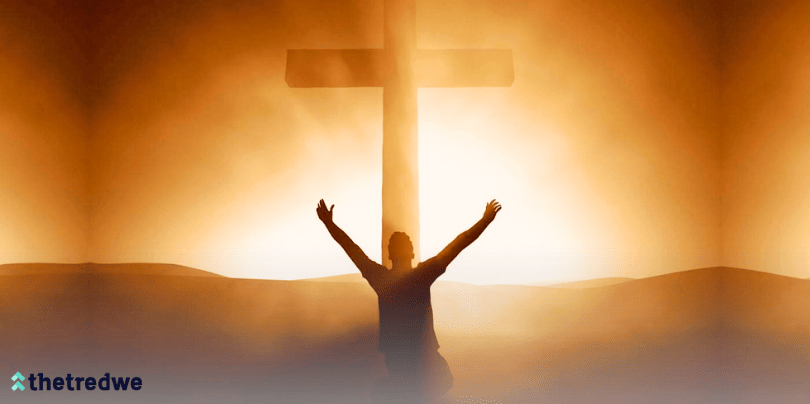
Good Friday is a significant day for Christians worldwide as it marks the crucifixion of Jesus Christ. The day is observed on the Friday before Easter Sunday and is considered one of the most solemn days in the Christian calendar. In this article, we will explore the meaning and significance of Good Friday, fasting rules, meals, and more.
Good Friday Meaning
Good Friday commemorates the crucifixion of Jesus Christ, who was sentenced to death by the Roman authorities. According to the Bible, Jesus was arrested on the Thursday night before Good Friday and was tried and convicted of blasphemy by the Jewish authorities. He was then handed over to the Romans, who sentenced him to death by crucifixion. Jesus was crucified at noon on Friday and died at 3 pm. His body was taken down from the cross and buried in a tomb.
The meaning of Good Friday is twofold. First, it serves as a reminder of the sacrifice that Jesus made for humanity. According to Christian belief, Jesus died on the cross to atone for the sins of humanity, and his death represents the ultimate act of love and selflessness.
Second, Good Friday is a day of mourning and reflection. Christians are encouraged to spend the day in quiet contemplation, reflecting on the sacrifice of Jesus and the meaning of his death. Many churches hold special services on Good Friday, which include readings from the Bible and prayers.
Good Friday Date: Friday, Apr 7, 2023
Significance Of Good Friday
Good Friday is significant for Christians worldwide as it is a reminder of the sacrifice that Jesus made for humanity. The crucifixion of Jesus represents the ultimate act of love and selflessness, and it is a central tenet of the Christian faith.
Good Friday also marks the beginning of the Easter weekend, which culminates in the celebration of Easter Sunday. Easter Sunday is the most significant day in the Christian calendar as it commemorates the resurrection of Jesus Christ. The resurrection of Jesus represents the triumph of life over death and is seen as a symbol of hope and renewal.
Good Friday Fasting Rules
Many Christians observe a fast on Good Friday as a sign of respect and mourning for Jesus. Fasting involves abstaining from food or drink for a specified period. The rules for fasting on Good Friday vary depending on the denomination and individual beliefs. Here are some examples of Good Friday fasting rules that are observed by various Christian denominations.
Catholic Fasting Rules: In the Catholic Church, fasting on Good Friday means that individuals between the ages of 18 and 59 should consume only one full meal and two smaller meals that together do not equal a full meal. Meat is also forbidden on this day, although fish is allowed. However, if a person has a medical condition that requires them to eat meat, they may do so.
Eastern Orthodox Fasting Rules: The fasting rules for Good Friday in the Eastern Orthodox Church are stricter than those of the Catholic Church. Members of this denomination are required to abstain from all animal products, including meat, eggs, and dairy, as well as oil and wine. Those who are unable to fast for medical reasons may be excused from this rule.
Anglican Fasting Rules: In the Anglican Church, fasting on Good Friday is encouraged but not required. However, many Anglicans choose to fast as a form of spiritual discipline. Those who do fast may choose to abstain from meat or limit their food intake in other ways.
Methodist Fasting Rules: The Methodist Church encourages its members to fast on Good Friday as a way to draw closer to God. However, the specific rules for fasting are left up to the individual. Some Methodists choose to abstain from all food for the entire day, while others may limit their food intake in other ways.
Baptist Fasting Rules: Like the Anglican Church, the Baptist Church does not require its members to fast on Good Friday. However, some Baptists choose to fast as a form of spiritual discipline. Those who do fast may choose to abstain from meat or limit their food intake in other ways.
Good Friday Meals
The traditional Good Friday meal for those who observe the fast typically consists of simple, meatless dishes. Fish is a common choice, as it is not considered meat in many traditions. Other options may include soups, salads, and vegetables. Some people choose to eat only bread and water as a form of extreme fasting.
In some cultures, there are specific Good Friday dishes that are traditional. For example, in Italy, it is traditional to eat a dish called “capellini with tomato sauce” on Good Friday. In the Philippines, a traditional Good Friday dish is “binignit,” a sweet soup made from coconut milk, bananas, and other fruits.
It’s worth noting that while fasting is an important part of the Good Friday observance for many Christians, it’s not necessary or expected for everyone to fast. Those who are ill, pregnant, or otherwise unable to fast should not feel guilty or ashamed. The important thing is to focus on the spiritual significance of the day and engage in acts of reflection and contemplation.
Good Friday Traditions
Attending Church Services: There are several traditions associated with Good Friday that are observed by Christians worldwide. One of the most common traditions is attending church services. Many churches hold special services on Good Friday, which include readings from the Bible and prayers.
Veneration of the Cross: Another tradition is the veneration of the cross. In some churches, a large wooden cross is placed at the front of the sanctuary, and members of the congregation are invited to come forward and kneel before the cross. This act of veneration is a sign of respect and reverence for the sacrifice of Jesus.
Stations of the Cross: Another tradition associated with Good Friday is the Stations of the Cross. The Stations of the Cross are a series of 14 events that occurred during the crucifixion of Jesus. Many churches hold a special service on Good Friday that includes the Stations of the Cross, where members of the congregation move from station to station, reflecting on each event and offering prayers.
Good Friday Service Ideas
If you’re planning a Good Friday service, there are several ideas that you can incorporate to make it a meaningful and impactful experience for your congregation. Here are some Good Friday service ideas to consider:
Reflection and Contemplation: Good Friday is a day of mourning and reflection, so it’s important to create an environment that allows for quiet contemplation. Consider dimming the lights and using candles or low lighting to create a peaceful atmosphere. You could also play soft instrumental music or have a period of silence for reflection.
Scripture Readings: Reading from the Bible is an important part of Good Friday services. Consider reading passages that recount the events leading up to and during the crucifixion of Jesus, such as John 18-19, Mark 15, or Luke 23.
Prayer: Prayer is an essential component of any religious service, and Good Friday is no exception. Consider incorporating periods of prayer throughout the service, including a prayer of confession, a prayer of thanksgiving, and a prayer for forgiveness.
Music: Music can be a powerful tool for worship, and there are many hymns and songs that are appropriate for Good Friday services. Consider selecting songs that focus on the sacrifice of Jesus, such as “Were You There,” “When I Survey the Wondrous Cross,” or “O Sacred Head, Now Wounded.”
Communion: Communion, also known as the Lord’s Supper, is a traditional part of Good Friday services. Consider having a time of communion during the service, where members of the congregation can take bread and wine (or grape juice) in remembrance of the sacrifice of Jesus.
Reflection Stations: Reflection stations are a great way to engage members of the congregation in a more interactive and reflective experience. You could set up several stations around the sanctuary, each with a different focus. For example, one station could be dedicated to prayer, another to Scripture reading, and another to visual art or symbolism.
Sermon: A sermon is an opportunity for the pastor or leader of the service to provide a message of reflection and inspiration. Consider focusing on the sacrifice of Jesus and its significance for Christians today.










